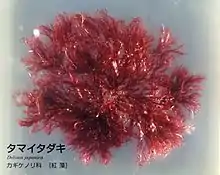Delisea pulchra
Delisea pulchra is a red algae found in Southern Australia, New Zealand, the Subantarctic Islands and the Antarctic Peninsula.[1] It produces a range of secondary metabolites called halogenated furanones that have ecological roles as defenses against epiphytes and herbivores.[2]
| Delisea pulchra | |
|---|---|
 | |
| Delisea pulchra at the National Museum of Nature and Science, Tokyo | |
| Scientific classification | |
| (unranked): | Archaeplastida |
| Division: | Rhodophyta |
| Class: | Florideophyceae |
| Order: | Bonnemaisoniales |
| Family: | Bonnemaisoniaceae |
| Genus: | Delisea |
| Species: | D. pulchra |
| Binomial name | |
| Delisea pulchra (Greville) Montagne | |
| Synonyms | |
|
Delisea japonica | |
Halogenated furanones in Delisea pulchra
- Localisatiion of furanones
Furanones are localised in the central vesicle of gland cells in D. pulchra[2]. The presence of a series of conjugated double bonds in the structure of furanones causes these compounds to fluoresce when excited by the in the wavelength close to UV, giving them an auto fluorescence character. Four (4) main types of halogenated furanones where found in this species. The halogen chemical element is the Bromine (Br), these four compounds of halogenated furanones are :[2]
- Prevention of biofilm on Delisea pulchra's surface
Delisea pulchra produces halogenated furanones to displace acylated homoserine lactose (AHL) molecules from bacteria receptor proteins with its structurally similar halogenated furanones, which has shown to prevent biofilm accumulation at ecologically reasonable concentrations in AHL bioassays.[3]
- Ecological roles
References
- 1922-, Womersley, H. B. S. (Hugh Bryan Spencer) (1984). The marine benthic flora of southern Australia. D.J Woolman, Govt. Printer. ISBN 978-0642248497. OCLC 13331680.CS1 maint: numeric names: authors list (link)
- Dworjanyn, S. A.; Nys, R. De; Steinberg, P. D. (1999-05-01). "Localisation and surface quantification of secondary metabolites in the red alga Delisea pulchra". Marine Biology. 133 (4): 727–736. doi:10.1007/s002270050514. ISSN 0025-3162.
- Manefield, Michael; de Nys, Rocky; Naresh, Kumar; Roger, Read; Givskov, Michael; Peter, Steinberg; Kjelleberg, Staffan (1999-02-01). "Evidence that halogenated furanones from Delisea pulchra inhibit acylated homoserine lactone (AHL)-mediated gene expression by displacing the AHL signal from its receptor protein". Microbiology. 145 (2): 283–291. doi:10.1099/13500872-145-2-283. ISSN 1350-0872.